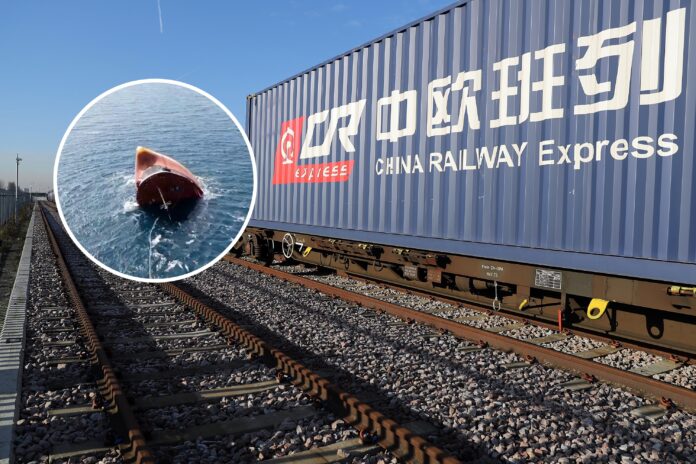Russia is reportedly profiting from Houthi attacks in the Red Sea as Moscow’s war in Ukraine and Israel’s war on Hamas both continue to rage.
The Houthis, an Iran-backed militant group based in Yemen, have been attacking the Red Sea’s busy maritime shipping corridor since shortly after Israel launched its ongoing assault in Gaza following the surprise October 7 attack by Hamas.
Meanwhile, Russia has been heavily sanctioned since invading Ukraine on February 24, 2022. Many goods that normally traveled by ground through Russia on their way from Asia to Europe were shifted to the Red Sea route as a result.
The volatility prompted sea shipments to begin taking a far longer route, traveling from Asia to Europe by circumnavigating Africa via the Cape of Good Hope. The Financial Times reported on Monday that requests to instead ship goods through Russia by rail have soared.
Dan Kitwood; Al-Joumhouriah Channel
While European Union (EU) sanctions prevent the transportation of goods through Russia by road, no such restrictions apply to rail travel, as long as the cargo does not originate in Russia.
German shipping company DHL reportedly said that requests for shipments using Moscow’s state-owned company Russian Railways (RZD) had skyrocketed by 40 percent since the Houthis forced the longer route to become commonplace in December.
“The requests have picked up since the beginning of the situation in the Red Sea by around 40 percent,” DHL told The Financial Times. “The overwhelming amount is going through Russia.”
Similarly, specialist shipping companies RailGate Europe and Rail Bridge Cargo both said that demands for commercial shipments to take the Russian rail route had increased by over 30 percent following the Houthi attacks.
Although companies like RailGate Europe have avoided dealing directly with RZD, the Russian government-controlled company is ultimately in charge of the rail system and financially benefits from any shipments.
Both the EU and the U.S. did impose sanctions on RZD following the invasion of Ukraine. However, loopholes remain that allow the railway to be legally used for commercial freight as long as the shipments do not originate or stop in Russia.
Newsweek reached out for comment to RZD, the EU and the U.S. Treasury Department via email on Monday.
While the total amount of cargo transported through Russia since the Houthi attacks began is unclear, any resulting profits that RZD has acquired will likely be used, at least in part, to continue to fund Russia’s war in Ukraine.
The Houthis have vowed to continue attacking the Red Sea corridor for as long as Israel continues its attacks on Gaza, which have increasingly come under international criticism and condemnation following the reported deaths of more than 30,000 Palestinians.
Uncommon Knowledge
Newsweek is committed to challenging conventional wisdom and finding connections in the search for common ground.
Newsweek is committed to challenging conventional wisdom and finding connections in the search for common ground.


